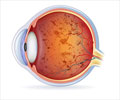Scientists have rescued mini retinas from eye disease retinitis pigmentosa via a new gene therapy approach.

RP is a group of rare, genetic disorders that involve a breakdown and loss of cells in the retina, which is the light sensitive tissue that lines the back of the eye. Common early stage symptoms include difficulty seeing at night and a loss of side (peripheral) vision, with blindness often developing in time.
Scientists have known for some time that mutations in the gene 'RP2', which is responsible for making a protein essential for normal vision, are associated with RP diseases. However, there are currently no therapies to treat people living with a number of RP diseases.
The collaborative team behind the exciting new research used a modified common virus to deliver a normal, functioning copy of the RP2 gene into "mini retinas", which had been engineered from stem cells and which contained the defective version of the gene. The "mini retinas" developed in UCL simulated the RP2 disease in patients.
Subsequent analysis showed that these mini retinas had successfully taken up the functioning RP2 gene following the viral delivery and produced the essential protein associated with it. Crucially, the treated mini retinas showed significant improvement - underlining that the approach had rescued them from RP.
Advertisement
"In relative terms it is now fairly easy to replace troublesome genes with functioning versions using non-harmful viruses, which is what we have done here. And while we are still some time and a lot of work away from an approved therapy it is hugely exciting to have begun a journey that could one day provide an effective treatment to rescue eyesight."
Advertisement
Professor Cheetham said: "It is an important development that we can now reproduce so many elements of inherited disease using these mini-retinas. It makes it possible for us to study in detail why people go blind and try to find ways to prevent blindness. It's exciting that the gene therapy seems to be so effective for this form of RP."
Ocular research in Trinity College Dublin is supported by the Health Research Board of Ireland, Science Foundation Ireland, Fighting Blindness Ireland and Health Research Charities Ireland.
Source-Eurekalert















